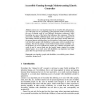Free Online Productivity Tools
i2Speak
i2Symbol
i2OCR
iTex2Img
iWeb2Print
iWeb2Shot
i2Type
iPdf2Split
iPdf2Merge
i2Bopomofo
i2Arabic
i2Style
i2Image
i2PDF
iLatex2Rtf
Sci2ools
118
Voted
INTETAIN
2009
Springer
2009
Springer
Accessible Gaming through Mainstreaming Kinetic Controller
Leisure is a very important aspect in our everyday life; and gaming is one of the main ways to it. Depending on the particular situation of each person, the way of playing could be very different. Motivation, preferences, skills, knowledge are some of the factors that influences this experience. When the person has a disability, additional agents come to scene such as cognitive level and mobility. Besides the design of the game, these factors clearly affect how the person interacts with the game; its user interface. In this paper we present a tool that allows people with disabilities to play games with a normalized user interface. This tool a) manages several wireless kinetic remote controllers, e.g. the Wiimotes; b) can be configured to capture any voluntary movements users could do and c) convert them into the specific inputs required by existing adapted games. As a result, users with disabilities can experience and enjoy games that were previously inaccessible to them.
Human Computer Interaction | Important Aspect | INTETAIN 2009 | Particular Situation | User Interface |
Related Content
| Added | 26 May 2010 |
| Updated | 26 May 2010 |
| Type | Conference |
| Year | 2009 |
| Where | INTETAIN |
| Authors | Yolanda Garrido, Álvaro Marco, Joaquín Segura, Teresa Blanco, Roberto Casas |
Comments (0)

